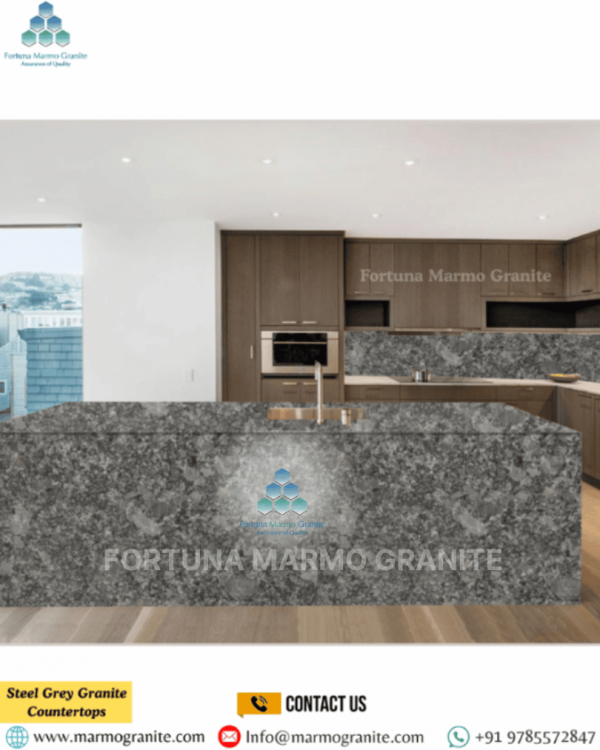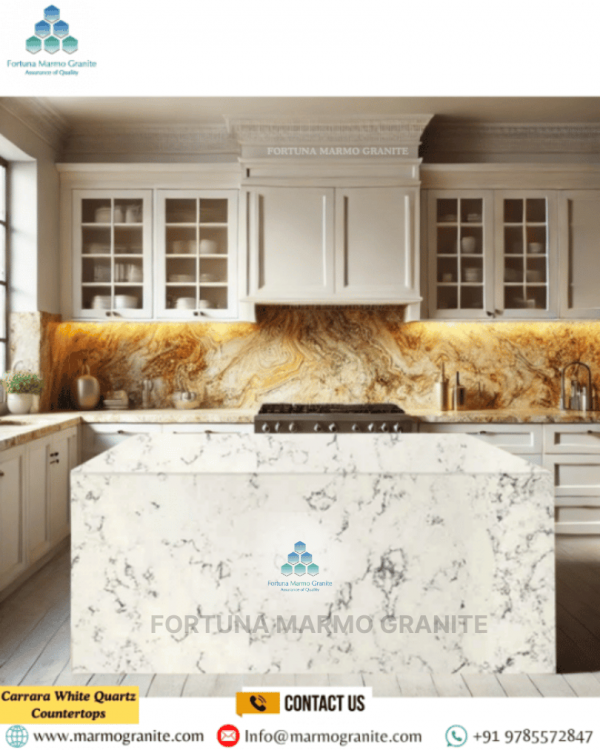Granite Countertops vs Quartz Countertops: A Comprehensive Comparison
Granite Countertops vs Quartz are frequently at the top of the list when choosing the ideal countertop material for your house. Both materials have special benefits and are popular among homeowners due to their practicality, durability, and beauty. Nevertheless, each has unique qualities that can make one better suited for your needs than the other. To assist you in making an informed choice, we will examine the main distinctions and advantages of granite and quartz countertops in this blog.
Granite Countertops: The All-Natural Option
Advantages of Granite Countertops
- Distinct Look: Granite is a naturally occurring material, therefore no two slabs are same. Because of this, every countertop has a distinct, one-of-a-kind appearance, making it ideal for homeowners looking for design uniqueness.
- Variety: Granite is available in a broad spectrum of hues and patterns, ranging from subdued whites and grays to striking reds and blues, so homeowners may pick a style that goes well with their area.
- Eco-Friendly: Compared to constructed materials, granite has a smaller environmental impact because it is a natural resource.
- Unique Aesthetic Appeal: Granite's naturally occurring formation ensures that no two slabs are identical. This inherent uniqueness makes each countertop stand out, providing a distinctive and personalized look that appeals to homeowners seeking originality in design. The natural formation of this granite guarantees that every slab is one-of-a-kind, with variations in color.
Disadvantages of Granite Countertops
- Porosity: If granite is not adequately sealed, it may absorb liquids due to its inherent porosity.
- Cost: Premium granite can be pricey, particularly if it has elaborate patterns or rare colors.
- Weight: Because granite is heavy, its weight may need to be supported by reinforced cabinets.
- Porosity Concerns: Granite's natural porosity requires proper sealing to prevent it from absorbing liquids and developing stains over time. Regular maintenance is essential to maintain its resistance to moisture.
- Expense Factor: High-end granite varieties featuring intricate patterns or rare hues can come with a steep price tag, making it a luxurious option for countertops.
- Weight Challenges: The substantial weight of granite slabs often necessitates reinforced cabinetry or structural support to ensure safe and secure installation.
Quartz Countertops: The Engineered Marvel
Advantages of Quartz Countertops
1. Uniformity: Quartz has a uniform appearance in contrast to granite. Because of this, it's a great option for people who like a more standardized and contemporary appearance.
2. Non-Porous Surface: Since quartz is non-porous, sealing is not necessary. As a result, it is resistant to stains, bacteria, and dampness.
3. Low Maintenance: All you need is soap and water to clean and maintain quartz. Unlike granite, it doesn't need to be sealed on a regular basis.
4. Durability: Because quartz is so resistant to heat, scratches, and chipping, it may be used in both baths and kitchens.
5. Various Patterns and Colors: Quartz is available in a wide range of patterns and colors, some of which are similar to those found in actual stone.
Disadvantages of Quartz Countertops
- Price: Quartz is generally comparable in price to high-end granite, making it a significant investment.
- Susceptible to Heat: While quartz is durable, excessive heat can damage its resin, causing discoloration or cracking.
- Not Entirely Natural: Some homeowners prefer the authenticity of natural stone, which quartz cannot replicate entirely.
- Cost Consideration: Quartz countertops are priced similarly to premium granite options, making them a considerable investment for any project.
- Heat Sensitivity: Quartz is durable, but its resin component can be damaged by high heat, leading to discoloration, warping, or cracking. Prolonged exposure to hot pots or pans can cause this damage.
Which One Should You Choose?
- Granite is the best option if you value distinctive patterns and organic beauty.
2. Quartz is a great option if you desire uniformity and low upkeep.
3. Due to its natural composition, granite is more suitable for outdoor settings in a variety of weather situations.
4. The non-porous surface of quartz guarantees hygienic conditions and simplicity of cleaning in indoor kitchens and bathrooms.
Conclusion
Granite and quartz countertops are also excellent choices because they combine durability, utility, and beauty. Granite Countertops vs Quartz, Your decision will improve the aesthetics and value of your space, whether you go with the classic appeal of natural granite or the contemporary ease of manufactured quartz.
Granite Countertops vs Quartz, We at Fortuna Marmo Granite specialize in high-end granite and quartz worktops, so you can be sure to discover the ideal combination for your project. Get in touch with us right now to discuss your alternatives and allow us to assist you in designing a beautiful and useful workplace.



